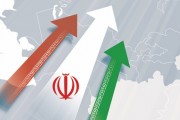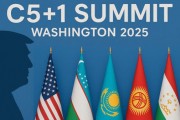Publish Date
Sunday 27 July 2025 - 13:50
recommended
0
The Zionist Regime and Turkish Convergence
How Has the Zionist Regime Responded to the Turkish Convergence Process?
Despite the Zionist regime's broad and principled alignment with the Turkish convergence process, it seems that Zionists are seeking to “change the direction” or even “appropriation certain functions” of this trend by adopting a policy of “control and containment”. This approach is by no means considered favorable for Turkey. In addition to some specific instances concerning Cyprus issue and the Abraham Accords, the formation of triangular platforms involving the United States, the Zionist regime, and Azerbaijan in 2024 also represents a significant behavioral indicator in this regard. Although from Zionists’ standpoint this is generally viewed as a leverage against Iran, on a second level it is seen as a response to Turkey’s growing influence in the South Caucasus and Central Asia.
By: Central Asia Working Group, Institute for East Strategic Studies (IESS)
8 minutes Reading
8 minutes Reading
| What You Read in This Report 1.Introduction 2.Supportive and Strengthening Approach 3.Divergent Approaches 4.Conclusion |
Introduction
The Turkic world unity has been one of Turkey’s ambitious and grand ideas in recent years. Central Asia, as a vital part of this concept, has so far shown an increasing trend of coordination and alignment with Turkey. This process of Turkish convergence has affected the interests of various actors, including Iran, Russia, and even China. In reductionist interpretations, this strategy is considered merely Turkish-initiated and Westoriented, enjoying full support from the United States and even actors such as the Zionist regime. However, recent developments and behavioral patterns of various actors demonstrate that the behavior of Zionist regime and the United States regarding the Turkish convergence process involves greater complexity. This report attempts to examine and analyze these complexities, and evaluate their relationship with the interests of the Islamic Republic of Iran.
Supportive and Strengthening Approach
The historical development of PanTurkism ideology—initially instigated by British spies, later spreading into Central Asia and the South Caucasus while also creating racial and ethnic divisions within Muslim societies in the region—provided the necessary foundation for Zionist regime’s alignment with this process. This stance has led the United States, and subsequently Zionist regime, to offer special support for Turkey's convergence process in order to foster the ideology of PanTurkism as an alternative to Iranian and Russian approaches. In this interpretation, Turkish and Zionist regime interests align in the same direction, resulting in convergent actions.
An assessment of the Zionists analytical sources in the Hebrew-language media shows that Zionist regime has explicitly supported this idea, believing that it can fulfill its own security, political, and economic interests. In this view, Zionist analysts see Azerbaijan’s intermediary role as highly beneficial to Zionist regime, believing that Azerbaijan—due to its role in rebuilding Turkey–Israel relations after 2011—will provide further capabilities for Turkic countries to converge with the Zionist regime.
At the same time, other reasons and factors have also been raised for the Zionist regime to benefit from Turkish convergence. In Zionist-related sources, it is clearly stated that the unity of Turkic peoples in the north is viewed as a mechanism for encircling Iran. Consequently, Zionist regime’s exploitation of Turkish encirclement and the reduction of Iran’s strategic advantages is also a key theme.
The expansion and replication of the Azerbaijani model, as well as strengthening Baku’s role and capacity in interregional communications—i.e., the Turkish convergence process—have thus become part of Zionist regime’s strategic interests. On the other hand, the United States regards Turkey as a reliable ally—a NATO member—that can act as a proxy actor advancing some NATO initiatives within the framework of Turkish convergence in Central Asia.
This approach is particularly viable because Russia’s and China’s responses to this trend have been muted, thus lowering the costs for Washington. Zionist regime too, seeing NATO as a powerful lever for its protection and support, clearly reinforces this trend.
Religion is another factor that reproduces and encourages this supportive stance. The strengthening of secularism in the region and even the resurgence of nonIslamic tendencies in Central Asia—such as Tengrism—is another aspect of Zionist regime’s and the United States’ approach. In the long term, this may play a significant role in shifting public opinion and forming loyal groups. Additionally, various Jewish streams have held the belief that Turkic-speaking countries generally exhibit less anti-Semitism compared to other Muslim societies, a perception rooted in ethnic links and religious tendencies of their governments and communities.
In this light, expanding and reinforcing their positions can support a Jewish state rather than Islamic currents. Nonetheless, one of the changes that has led to a discursive shift in this approach is the strengthening of the Muslim Brotherhood's Islamist tendencies in Turkey and its connection to Ankara's regional interests, under Erdogan's watch. The victory of these Turkey-supported fundamentalists in Syria marks a turning point that could append this Islamist–Muslim Brotherhood orientation to Turkic ideologies, giving a new religious face to PanTurkism—generally influenced by Turkey’s interests in the Middle East. The role played by Turkic-origin groups from Central Asia and China’s Uyghur communities in Syria under the guise of Islamist currents highlighted such a role. This trend laid the groundwork for the first serious shift in Zionist regime’s approach toward the Turkish convergence process.
Divergent Approaches
Despite Zionist regime ’s significant interests in the Turkish convergence process, divergent approaches have emerged owing to the attachment of religious currents to the Turkish convergence, and the newly emerging differences between Turkey and Zionist regime in Syria. Some illustrative examples of this issue can be examined. The Cyprus case is one such example, which has seriously impacted the process and structure of Turkish convergence in Central Asia.
In the recent European Union summit, all Central Asian countries jointly emphasized United Nations Security Council Resolutions 541 and 550. These resolutions condemn Turkey's recognition of Turkish Cyprus and formally recognize Greek Cyprus as the legitimate representative of the island. Subsequently, Uzbekistan announced the opening of its embassy in Cyprus, followed by Kazakhstan. Turkmenistan also introduced its ambassador in Italy as a non-resident ambassador in Cyprus. This development effectively thwarted all of Turkey’s efforts to gain recognition of Turkish Cyprus, and elicited strong reactions from Turkish media and political circles.
However, it appears that Turkey has officially adopted a strategy of “strategic patience” in order to maintain its convergence process. It should not be forgotten that Turkey’s strategic isolation on one of the most critical issues of its foreign policy—and even its security doctrine—regarding Greece is not only a European issue, but also one in which Zionist regime’s footprints are evident
In the past two years, the rivalry between Turkey and the Zionist regime in Cyprus has intensified. One of the most notable manifestations of this is the publication of reports indicating that the security of Greek Cypriot airports is being ensured by Mossad. At the same time, this strategy has coincided with the strengthening of the U.S. presence on the island through the installation of new radars, which indicates a joint U.S.-Zionist strategy against Turkey in Cyprus.
Some sources have stated that these radars are being installed to be networked with the Zionist regime’s radar systems, and in addition, the prospect of Greek Cyprus joining NATO has also been raised. Moreover, the extensive and numerous purchases of land and buildings in Northern Cyprus by Zionist citizens, with structured support from Netanyahu, are considered another part of the Zionist regime’s plan against Turkey—given that Cyprus is also counted among the promised lands for Zionist Jews. Therefore, the expansion of the Cyprus issue to Central Asia, particularly to the Turkic-speaking countries in the region, is seen as an inevitable divergent stance by the Zionist regime toward Turkish convergence, which has created a serious rift between Turkey and other Turkic-speaking countries in the region.
Another issue that seems to exacerbate this divergence at a lower level is the accession of some Turkic-speaking countries to the Abraham Accords and the branding of Turkic alignment with the Zionist regime. The Accords, signed during Trump’s first administration to normalize Arab-Israel relations, now appear to be reintroduced during his second term as a plan prioritizing U.S. interests (not necessarily those of the Zionist regime).
It seems that Trump’s new administration is seeking to revive the Accords by expanding them to new players, including those in Central Asia and the South Caucasus, viewing it as a counterbalance to Russia, China, and Iran. At the same time, the Trump administration, with support from the Zionist regime, aims to assign a greater role to Central Asian countries in Middle Eastern developments. Despite the Zionist regime’s support and endorsement of this idea, there appear to be increasing disagreements among the Turkic-speaking countries in this regard.
Some analysts argue that the accession of Azerbaijan, Kazakhstan, and even Uzbekistan to the Abraham Accords and their more active participation in this political mechanism would not bring new benefits, but would merely complicate relations with Turkey. This complexity has arisen due to emerging tensions in Turkish-Israeli relations. The membership of Turkic-speaking countries in the Abraham Accords, at a time when Turkey is not part of it and simultaneously maintains an anti-Zionist discourse to preserve its Islamist support base, is perceived as an attempt by the Zionist regime to weaken convergence among Turkic countries.
Meanwhile, some Turkish and Azerbaijani experts have emphasized that further strengthening of ties between Turkic-speaking countries and the Zionist regime—at a time when Erdoğan has labeled this regime a “terrorist state”—will be seen as a factor leading to divergence from Ankara. This is because, according to Ankara, the Zionist regime, has initiated a strategy to undermine Turkey’s role in the Middle East and its surrounding environment after the establishment of the al-Julani government in Syria.
Conclusion
Despite the overall and principled support of the Zionist regime for the Turkish convergence process, it appears that the process is now on the verge of a “change of direction” or the “appropriation of certain functions” through a strategy of “control and containment” by Zionists.
This approach is by no means favorable to Turkey. In addition to the aforementioned examples regarding Cyprus and the Abraham Accords, the formation of trilateral platforms involving the U.S., the Zionist regime, and Azerbaijan in 2024 is also considered a significant behavioral indicator in this regard. Although this was generally viewed by the Zionist regime as a means of exerting pressure on Iran, at a secondary level, it also aims to counter Turkey’s growing influence in the South Caucasus and Central Asia.
Meanwhile, it is important to note that Russia has not yet shown serious resistance to the Turkish convergence process, as Moscow believes that the Organization of Turkic States (OTS) will, at best, remain a second-tier entity, and that Turkey and the Turkish convergence lack the necessary resources to balance Russia and China. However, the involvement of the U.S. in this process, at the level of political behavior and as a non-Russian, non-Chinese balancing force, could provoke Russian interests.
In this context, the growing anti-Turkish tendencies within the Zionist regime’s approach may lead to the strengthening of opposing currents in Turkic societies, centered around Turkey’s positions. Turkey’s resistance to this trend, against Azerbaijani lobbying for its acceptance, is a factor that will clearly determine the type and level of impact that these approaches will have on Iran's interests.
The Turkic world unity has been one of Turkey’s ambitious and grand ideas in recent years. Central Asia, as a vital part of this concept, has so far shown an increasing trend of coordination and alignment with Turkey. This process of Turkish convergence has affected the interests of various actors, including Iran, Russia, and even China. In reductionist interpretations, this strategy is considered merely Turkish-initiated and Westoriented, enjoying full support from the United States and even actors such as the Zionist regime. However, recent developments and behavioral patterns of various actors demonstrate that the behavior of Zionist regime and the United States regarding the Turkish convergence process involves greater complexity. This report attempts to examine and analyze these complexities, and evaluate their relationship with the interests of the Islamic Republic of Iran.
Supportive and Strengthening Approach
The historical development of PanTurkism ideology—initially instigated by British spies, later spreading into Central Asia and the South Caucasus while also creating racial and ethnic divisions within Muslim societies in the region—provided the necessary foundation for Zionist regime’s alignment with this process. This stance has led the United States, and subsequently Zionist regime, to offer special support for Turkey's convergence process in order to foster the ideology of PanTurkism as an alternative to Iranian and Russian approaches. In this interpretation, Turkish and Zionist regime interests align in the same direction, resulting in convergent actions.
An assessment of the Zionists analytical sources in the Hebrew-language media shows that Zionist regime has explicitly supported this idea, believing that it can fulfill its own security, political, and economic interests. In this view, Zionist analysts see Azerbaijan’s intermediary role as highly beneficial to Zionist regime, believing that Azerbaijan—due to its role in rebuilding Turkey–Israel relations after 2011—will provide further capabilities for Turkic countries to converge with the Zionist regime.
At the same time, other reasons and factors have also been raised for the Zionist regime to benefit from Turkish convergence. In Zionist-related sources, it is clearly stated that the unity of Turkic peoples in the north is viewed as a mechanism for encircling Iran. Consequently, Zionist regime’s exploitation of Turkish encirclement and the reduction of Iran’s strategic advantages is also a key theme.
The expansion and replication of the Azerbaijani model, as well as strengthening Baku’s role and capacity in interregional communications—i.e., the Turkish convergence process—have thus become part of Zionist regime’s strategic interests. On the other hand, the United States regards Turkey as a reliable ally—a NATO member—that can act as a proxy actor advancing some NATO initiatives within the framework of Turkish convergence in Central Asia.
This approach is particularly viable because Russia’s and China’s responses to this trend have been muted, thus lowering the costs for Washington. Zionist regime too, seeing NATO as a powerful lever for its protection and support, clearly reinforces this trend.
Religion is another factor that reproduces and encourages this supportive stance. The strengthening of secularism in the region and even the resurgence of nonIslamic tendencies in Central Asia—such as Tengrism—is another aspect of Zionist regime’s and the United States’ approach. In the long term, this may play a significant role in shifting public opinion and forming loyal groups. Additionally, various Jewish streams have held the belief that Turkic-speaking countries generally exhibit less anti-Semitism compared to other Muslim societies, a perception rooted in ethnic links and religious tendencies of their governments and communities.
In this light, expanding and reinforcing their positions can support a Jewish state rather than Islamic currents. Nonetheless, one of the changes that has led to a discursive shift in this approach is the strengthening of the Muslim Brotherhood's Islamist tendencies in Turkey and its connection to Ankara's regional interests, under Erdogan's watch. The victory of these Turkey-supported fundamentalists in Syria marks a turning point that could append this Islamist–Muslim Brotherhood orientation to Turkic ideologies, giving a new religious face to PanTurkism—generally influenced by Turkey’s interests in the Middle East. The role played by Turkic-origin groups from Central Asia and China’s Uyghur communities in Syria under the guise of Islamist currents highlighted such a role. This trend laid the groundwork for the first serious shift in Zionist regime’s approach toward the Turkish convergence process.
Divergent Approaches
Despite Zionist regime ’s significant interests in the Turkish convergence process, divergent approaches have emerged owing to the attachment of religious currents to the Turkish convergence, and the newly emerging differences between Turkey and Zionist regime in Syria. Some illustrative examples of this issue can be examined. The Cyprus case is one such example, which has seriously impacted the process and structure of Turkish convergence in Central Asia.
In the recent European Union summit, all Central Asian countries jointly emphasized United Nations Security Council Resolutions 541 and 550. These resolutions condemn Turkey's recognition of Turkish Cyprus and formally recognize Greek Cyprus as the legitimate representative of the island. Subsequently, Uzbekistan announced the opening of its embassy in Cyprus, followed by Kazakhstan. Turkmenistan also introduced its ambassador in Italy as a non-resident ambassador in Cyprus. This development effectively thwarted all of Turkey’s efforts to gain recognition of Turkish Cyprus, and elicited strong reactions from Turkish media and political circles.
However, it appears that Turkey has officially adopted a strategy of “strategic patience” in order to maintain its convergence process. It should not be forgotten that Turkey’s strategic isolation on one of the most critical issues of its foreign policy—and even its security doctrine—regarding Greece is not only a European issue, but also one in which Zionist regime’s footprints are evident
In the past two years, the rivalry between Turkey and the Zionist regime in Cyprus has intensified. One of the most notable manifestations of this is the publication of reports indicating that the security of Greek Cypriot airports is being ensured by Mossad. At the same time, this strategy has coincided with the strengthening of the U.S. presence on the island through the installation of new radars, which indicates a joint U.S.-Zionist strategy against Turkey in Cyprus.
Some sources have stated that these radars are being installed to be networked with the Zionist regime’s radar systems, and in addition, the prospect of Greek Cyprus joining NATO has also been raised. Moreover, the extensive and numerous purchases of land and buildings in Northern Cyprus by Zionist citizens, with structured support from Netanyahu, are considered another part of the Zionist regime’s plan against Turkey—given that Cyprus is also counted among the promised lands for Zionist Jews. Therefore, the expansion of the Cyprus issue to Central Asia, particularly to the Turkic-speaking countries in the region, is seen as an inevitable divergent stance by the Zionist regime toward Turkish convergence, which has created a serious rift between Turkey and other Turkic-speaking countries in the region.
Another issue that seems to exacerbate this divergence at a lower level is the accession of some Turkic-speaking countries to the Abraham Accords and the branding of Turkic alignment with the Zionist regime. The Accords, signed during Trump’s first administration to normalize Arab-Israel relations, now appear to be reintroduced during his second term as a plan prioritizing U.S. interests (not necessarily those of the Zionist regime).
It seems that Trump’s new administration is seeking to revive the Accords by expanding them to new players, including those in Central Asia and the South Caucasus, viewing it as a counterbalance to Russia, China, and Iran. At the same time, the Trump administration, with support from the Zionist regime, aims to assign a greater role to Central Asian countries in Middle Eastern developments. Despite the Zionist regime’s support and endorsement of this idea, there appear to be increasing disagreements among the Turkic-speaking countries in this regard.
Some analysts argue that the accession of Azerbaijan, Kazakhstan, and even Uzbekistan to the Abraham Accords and their more active participation in this political mechanism would not bring new benefits, but would merely complicate relations with Turkey. This complexity has arisen due to emerging tensions in Turkish-Israeli relations. The membership of Turkic-speaking countries in the Abraham Accords, at a time when Turkey is not part of it and simultaneously maintains an anti-Zionist discourse to preserve its Islamist support base, is perceived as an attempt by the Zionist regime to weaken convergence among Turkic countries.
Meanwhile, some Turkish and Azerbaijani experts have emphasized that further strengthening of ties between Turkic-speaking countries and the Zionist regime—at a time when Erdoğan has labeled this regime a “terrorist state”—will be seen as a factor leading to divergence from Ankara. This is because, according to Ankara, the Zionist regime, has initiated a strategy to undermine Turkey’s role in the Middle East and its surrounding environment after the establishment of the al-Julani government in Syria.
Conclusion
Despite the overall and principled support of the Zionist regime for the Turkish convergence process, it appears that the process is now on the verge of a “change of direction” or the “appropriation of certain functions” through a strategy of “control and containment” by Zionists.
This approach is by no means favorable to Turkey. In addition to the aforementioned examples regarding Cyprus and the Abraham Accords, the formation of trilateral platforms involving the U.S., the Zionist regime, and Azerbaijan in 2024 is also considered a significant behavioral indicator in this regard. Although this was generally viewed by the Zionist regime as a means of exerting pressure on Iran, at a secondary level, it also aims to counter Turkey’s growing influence in the South Caucasus and Central Asia.
Meanwhile, it is important to note that Russia has not yet shown serious resistance to the Turkish convergence process, as Moscow believes that the Organization of Turkic States (OTS) will, at best, remain a second-tier entity, and that Turkey and the Turkish convergence lack the necessary resources to balance Russia and China. However, the involvement of the U.S. in this process, at the level of political behavior and as a non-Russian, non-Chinese balancing force, could provoke Russian interests.
In this context, the growing anti-Turkish tendencies within the Zionist regime’s approach may lead to the strengthening of opposing currents in Turkic societies, centered around Turkey’s positions. Turkey’s resistance to this trend, against Azerbaijani lobbying for its acceptance, is a factor that will clearly determine the type and level of impact that these approaches will have on Iran's interests.
News code:4071















